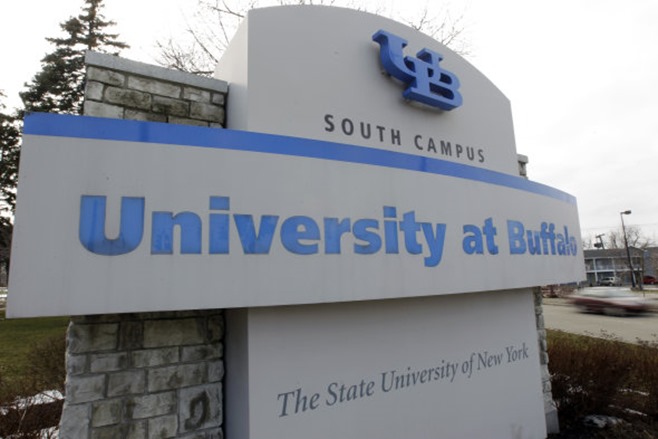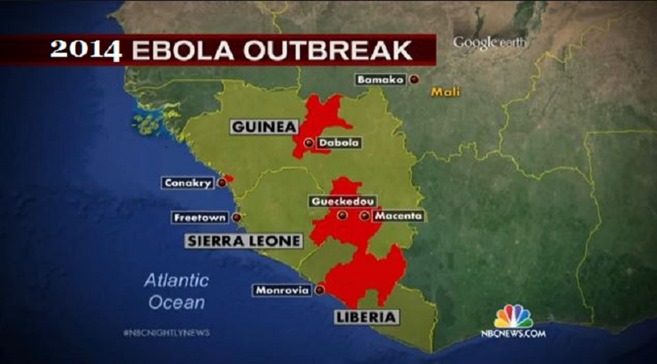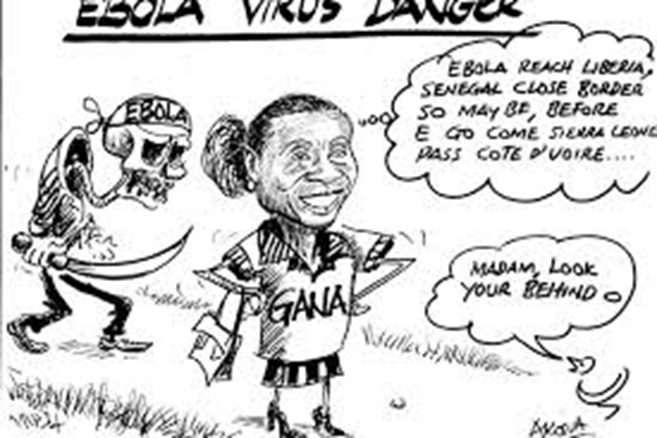Sven Longshanks
Daily Stormer
September 1, 2014

Instead of preparing for an Ebola outbreak, why are they not preventing one by banning all Africans from entering America?
The idea that simple hygiene precautions can prevent infection has already been show to be a fatal mistake.
Nobody is more aware of how the virus is transmitted than the Doctors themselves, yet many of them have already died from it.
What are they going to do if they find someone with it anyway? Everyone around them may already have caught it and be spreading it elsewhere.
This pretense of screening being a viable defence against infection is just there to give people a false sense of security.
There is only one way to prevent Ebola spreading – quarantine the whole of Africa and then let it burn itself out.
AOL:
College students from West Africa may be subject to extra health checks when they arrive to study in the United States as administrators try to insulate their campuses from the worst Ebola outbreak in history.
With the virus continuing to kill in Guinea, Liberia, Sierra Leone and Nigeria, the expected arrival of thousands of students from those countries has U.S. authorities on alert but cautioning against alarm.
“I can see why there would be concern; there’s no vaccine for it,” said Fatima Nor, an 18-year-old freshman at the University at Buffalo, where about 25 students from Nigeria are enrolled for fall. But she said knowing that the virus is transmitted strictly through direct contact with bodily fluids of sick people, and not by sitting next to someone in class, should be enough to calm nerves.
“As long as everyone keeps their personal space, it should be OK,” said Nor, of Buffalo.

While the Centers for Disease Control and Prevention have issued no specific recommendations for colleges, some state health departments, including in South Carolina and North Dakota, have spelled out for administrators what symptoms to look for and how to react.
Elsewhere, universities are drafting their own precautionary plans against the often-fatal hemorrhagic fever, which causes weakness, vomiting, diarrhea, internal bleeding and sometimes bleeding from the nose and ears.
The American College Health Association recommends its members update emergency plans, find out where patients have traveled and use isolation exam rooms when available. Several colleges are checking the temperatures of students arriving from affected countries and continuing to monitor for fever until any risk of contagion has passed.
“I don’t see this as a huge threat on college campuses,” said Dr. Susan Even, student health director at the University of Missouri-Columbia and a member of the ACHA, “but it makes sense when you’re communicating with students … to ask a question or two.”
U.S. universities count 9,728 active students from Nigeria, 204 from Liberia, 169 from Sierra Leone and 95 students from Guinea, according to the federal government.
The odds they could bring Ebola to campus seemed too small to worry Laura Washburn, a senior at Tufts University outside Boston.
“It’s not like I’m not going to class because someone has been to Africa,” she said. “I mean, it’s hard to say how paranoid we should be about it, but I feel pretty safe at Tufts.”
The roughly 30 Nigerian students expected at the University of Illinois will be pulled aside for a temperature check and private Ebola discussion when they arrive at the health center for mandatory immunization paperwork and tuberculosis screening, said Dr. Robert Palinkas, the center’s director.
The plans have been reassuring to the handful of parents who have called wondering whether their child’s placement with a West African roommate should give them reason to worry, he said.
“Parents are comforted to know that there is a screening process, that we are alert for it, that we are prepared for it,” Palinkas said, “and that we’re doing everything we can without infringing on the rights of anybody to make sure their son or daughter is going to have the lowest risk possible.”
Similar screenings are planned at the University at Buffalo, Mercer University in Georgia, Liberty University in Lynchburg, Virginia, and the University of Akron in Ohio, the campuses said.
Moses Ogunseye arrived from Lagos, Nigeria, a little over two weeks ago to study at Akron. The 31-year-old graduate student said he spent a few minutes filling out a questionnaire and was given a disposable thermometer to monitor himself for fever for a couple of weeks, something he doesn’t mind doing even though he is certain he hasn’t been exposed to Ebola.
“I would expect that. It’s a very logical thing to do,” he said of the screening, which, though voluntary, is encouraged.
Alma Olson, director of Student Health Services at the university, said students are being asked to keep tabs on their temperature for up to 21 days, the length of time it can take for symptoms of Ebola to appear following exposure.
Negroes have six to eight times as many offspring as White people because naturally they fall prey to disease and catastrophe a lot more than the White man.
Messing with nature by artificially keeping excessive amounts of them alive through medical advances that they have no hope of achieving by themselves is simply burning up all our resources for no reward. These people offer exactly zero to society, save crime and sports.
Nature culls the herd when there gets to be too many; if we interfere with that mechanism then we are the ones who will be punished for it.

